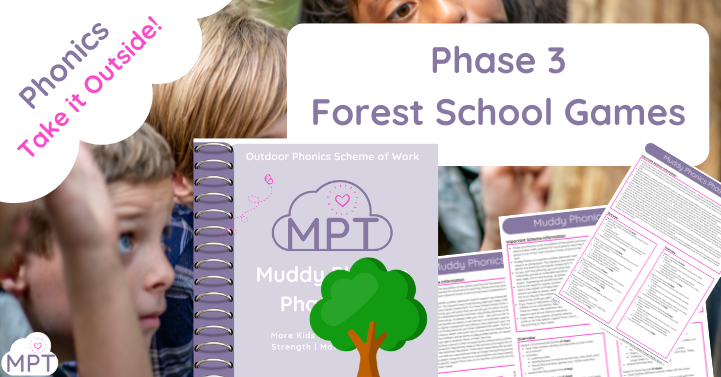Forest School Games: Phase Three Phonics
Forest School Games: Phase Three Phonics is a dynamic and engaging resource designed to support early reading and phonics development through nature-based play. Ideal for outdoor educators, teachers, and parents, this collection of games transforms phonics learning into an interactive and memorable experience.
What’s Inside?
- Over ten interactive phonics games designed for Phase 3 sounds, including digraphs and trigraphs.
- Low-prep activities that use natural materials such as leaves, sticks, and stones.
- Outdoor challenges that encourage movement, exploration, and teamwork.
- Activities that support blending, segmenting, and sound recognition through sensory-rich experiences.
- Adaptable for Forest Schools, outdoor classrooms, and garden learning.
Key Benefits
- Hands-on learning that connects phonics with real-world exploration.
- Encourages creativity by helping children discover letters and sounds in nature.
- Supports all learning styles, including visual, auditory, and kinesthetic.
- Suitable for both group activities and individual learning, with flexibility for different ages and abilities.
Whether in a Forest School setting, school playground, or backyard, this resource makes phonics learning an exciting and meaningful outdoor experience.
The concept of Forest Schools, which emphasizes immersive outdoor education, has evolved over centuries, drawing inspiration from various educational philosophies and practices worldwide.
Early Inspirations:
In the early 19th century, German educator Friedrich Fröbel introduced the idea of kindergartens, emphasizing play and nature as essential components of early childhood education. His approach laid the groundwork for integrating outdoor experiences into learning.
The Open-Air Movement:
In 1904, the Waldschule für kränkliche Kinder (Forest School for Sickly Children) was established in Charlottenburg, Germany. This initiative aimed to combat tuberculosis by providing children with fresh air and nature exposure, leading to the broader open-air school movement across Europe.
Scandinavian Developments:
The 1950s saw significant advancements in outdoor education in Scandinavia. In Denmark, Ella Flautau pioneered the first forest kindergarten, where children spent extensive time in nature, fostering holistic development. Around the same period, Sweden introduced the “Skogsmulle” concept, created by Gösta Frohm, to teach children about nature through storytelling and exploration.
Introduction to the UK:
The Forest School ethos was introduced to the UK during the 1990s, drawing inspiration from Scandinavian models. Bridgwater College in Somerset was a pioneer in this movement, adapting the concept to the UK context and emphasizing child-led learning in natural settings.
Global Expansion:
The success of Forest Schools in Europe led to their adoption worldwide. In 2007, Canada established its first forest school near Ottawa, emphasizing child-led, nature-based learning. Similarly, countries like Australia and New Zealand have integrated bush kindergartens and nature-based programs into their educational frameworks.
Modern-Day Forest Schools:
Today, Forest Schools are recognized globally for their benefits in fostering resilience, confidence, and a deep connection to the natural world among learners. Organizations like the Forest School Association in the UK provide resources and support for practitioners, ensuring the continued growth and development of this educational approach.
The journey of Forest Schools reflects a growing recognition of the importance of nature in education, adapting to cultural contexts while maintaining a core philosophy of experiential, child-centered learning.


